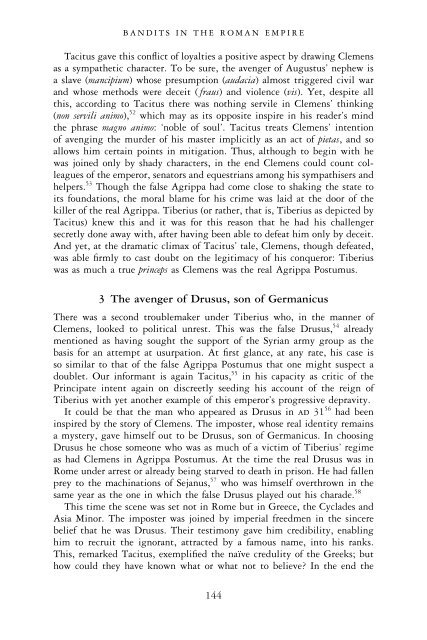You also want an ePaper? Increase the reach of your titles
YUMPU automatically turns print PDFs into web optimized ePapers that Google loves.
BANDITS IN THE ROMAN EMPIRE<br />
Tacitus gave this conflict of loyalties a positive aspect by drawing Clemens<br />
as a sympathetic character. To be sure, the avenger of Augustus’ nephew is<br />
a slave (mancipium) whose presumption (audacia) almost triggered civil war<br />
and whose methods were deceit ( fraus) and violence (vis). Yet, despite all<br />
this, according to Tacitus there was nothing servile in Clemens’ thinking<br />
(non servili animo), 52 which may as its opposite inspire in his reader’s mind<br />
the phrase magno animo: ‘noble of soul’. Tacitus treats Clemens’ intention<br />
of avenging the murder of his master implicitly as an act of pietas, and so<br />
allows him certain points in mitigation. Thus, although to begin with he<br />
was joined only by shady characters, in the end Clemens could count colleagues<br />
of the emperor, senators and equestrians among his sympathisers and<br />
helpers. 53 Though the false Agrippa had come close to shaking the state to<br />
its foundations, the moral blame for his crime was laid at the door of the<br />
killer of the real Agrippa. Tiberius (or rather, that is, Tiberius as depicted by<br />
Tacitus) knew this and it was for this reason that he had his challenger<br />
secretly done away with, after having been able to defeat him only by deceit.<br />
And yet, at the dramatic climax of Tacitus’ tale, Clemens, though defeated,<br />
was able firmly to cast doubt on the legitimacy of his conqueror: Tiberius<br />
was as much a true princeps as Clemens was the real Agrippa Postumus.<br />
3 The avenger of Drusus, son of Germanicus<br />
There was a second troublemaker under Tiberius who, in the manner of<br />
Clemens, looked to political unrest. This was the false Drusus, 54 already<br />
mentioned as having sought the support of the Syrian army group as the<br />
basis for an attempt at usurpation. At first glance, at any rate, his case is<br />
so similar to that of the false Agrippa Postumus that one might suspect a<br />
doublet. Our informant is again Tacitus, 55 in his capacity as critic of the<br />
Principate intent again on discreetly seeding his account of the reign of<br />
Tiberius with yet another example of this emperor’s progressive depravity.<br />
It could be that the man who appeared as Drusus in ad 3156 had been<br />
inspired by the story of Clemens. The imposter, whose real identity remains<br />
a mystery, gave himself out to be Drusus, son of Germanicus. In choosing<br />
Drusus he chose someone who was as much of a victim of Tiberius’ regime<br />
as had Clemens in Agrippa Postumus. At the time the real Drusus was in<br />
Rome under arrest or already being starved to death in prison. He had fallen<br />
prey to the machinations of Sejanus, 57 who was himself overthrown in the<br />
same year as the one in which the false Drusus played out his charade. 58<br />
This time the scene was set not in Rome but in Greece, the Cyclades and<br />
Asia Minor. The imposter was joined by imperial freedmen in the sincere<br />
belief that he was Drusus. Their testimony gave him credibility, enabling<br />
him to recruit the ignorant, attracted by a famous name, into his ranks.<br />
This, remarked Tacitus, exemplified the naïve credulity of the Greeks; but<br />
how could they have known what or what not to believe? In the end the<br />
144


